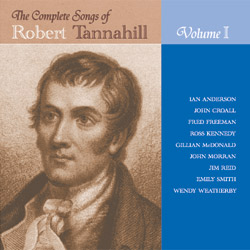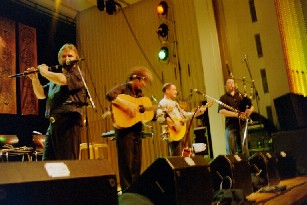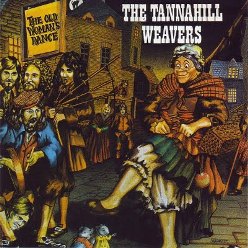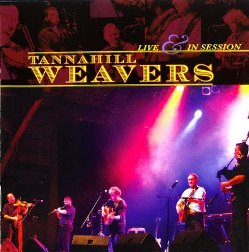Robert Tannahill

Robert Tannahill (June 3, 1774 – May 17, 1810) was a Scottish poet. Known as the 'Weaver Poet', his music and poetry is contemporaneous with that of Robert Burns. He was born in Paisley to a weaving family and was apprenticed in the same trade from the age of 12. After a short period of working in Bolton, Lancashire, England around 1800, Tannahill returned to Paisley to support the family in time of illness. In the years which followed, his interest in poetry and music blossomed and his writings began to appear in such publications as The Scots Magazine. In 1810, he died by his own hand, drowned in a culverted stream under the Paisley Canal
From: en.wikipedia.org/wiki/Robert_Tannahill

The Complete Songs of Robert Tan-nahill, Vol. I ; Brechin All Records ; CDBAR003 ; 2006
Fly We To Some Desert Isle (Emily Smith) / Hey Donald, How Donald (Wendy Weatherby) / Rob Roryson's Bannet (Gillian MacDonald) / The Braes o Balquhidder (John Croall) / The Five Friends (Jim Reid) / Coggie Thou Heals Me (Ross Kennedy) / Meg o the Glen & The Lassie o Merry Eighteen (John Croall) / When John and I were Married (Gillian MacDonald) / Jessie, The Flow'r o Dunblane (Ross Kennedy) / O Are Ye Sleeping Maggie (Jim Reid) / Barrochan Jean (John Morran) / Och Hey! Johnny Lad (Emily Smith) / The Dear Highland Laddie O (Gillian MacDonald) / Yon Burn Side (Ian Anderson) / With Waefu' Heart (Wendy Weatherby) / I'll Hie Me To The Shieling Hill (Ross Kennedy) / Molly My Dear (Ross Kennedy) / Eild (Fred Freeman) / I'll Lay Me On The Wintry Lea (Emily Smith)

The Tannahill Weavers
The Tannahill Weavers are a popular band who perform traditional Scottish music. Releasing their first album in 1976 they're notable for being one of the first popular bands to incorporate the sound of the Great Highland Bagpipe (the Highland bagpipes are primarily a solo instrument) in an ensemble setting, and in doing so helped to change the sound of Scottish traditional music.
The band was formed in 1968, practising in a back room of the McKay family's rented Council house at 41 St. Ninian's Road, Hunterhill, Paisley and first performed at St. Peter's Folk Club, Glenburn, Paisley. The Club was run by Pat Doherty, father of Weavers' founding member Neil Doherty.
As of 2009, they continue to tour and release new recordings. They are named after Scottish poet Robert Tannahill and have recorded several of his songs.
The current members of the band are:
- Roy Gullane (guitar, vocals)
- Phil Smillie (flute, tin whistles, bodhrán)
- Leslie Wilson (bouzouki, keyboards)
- John Martin (fiddle, cello, viola)
- Colin Melville (Highland bagpipes, Scottish smallpipes, tin whistles)
Past members have included: Alan MacLeod (Highland bagpipes, tin whistles, mandola, organ, vocals), Bill Bourne (vocals, bouzouki, guitar, electric guitar, fiddle, keyboards, bass pedals [FW#35]), Dougie MacLean (fiddle, mandolin, vocals, guitar, tenor banjo), Duncan J. Nicholson (Highland bagpipes, Scottish smallpipes, tin whistles), Gordon Duncan (Highland bagpipes, tin whistles [#25]), Hudson Swan (bouzouki, vocals, fiddle, glockenspiel, mandolin [#7]), Iain MacInnes (Highland bagpipes, Scottish smallpipes, tin whistles, vocals [#17]), Kenny Forsyth (Highland bagpipes, Scottish smallpipes, tin whistles), Mike Ward (fiddle, guitar, vocals), Ross Kennedy (bouzouki, fiddle, bass pedals, vocals [#35]), Stuart Morison (fiddles, bones, guitar), John Cassidy (whistles, vocals), Stuart McKay (vocals, guitar, penny whistle), Neil Doherty (vocals, guitar, mandolin, penny whistle), Jim McGowan (vocals)
en.wikipedia.org/wiki/The_Tannahill_Weavers

Discography
- Are Ye Sleeping Maggie (1976)
- The Old Woman's Dance (1978)
- The Tannahill Weavers (1979)
- Tannahill Weavers IV (1981)
- Passage (1984)
- Land of Light (1986)
- Dancing Feet (1987)
- Best of the Tannahill Weavers 1979 - 1989 (1989)
- Cullen Bay (1990)
- The Mermaid's Song (1992)
- Capernaum (1994)
- Leaving St. Kilda (1996)
- The Tannahill Weavers Collection: Choice Cuts 1987 - 1996 (1997)
- Epona (1998)
- Alchemy (2000)
- Arnish Light (2003)
- Live and In Session (2006)

Tannahill Weavers @ FolkWorld:
FW#5,
#8,
#15,
#18,
#20,
#28,
#33
![]() Geese in the Bog,
Farewell to Fiunary
Geese in the Bog,
Farewell to Fiunary
